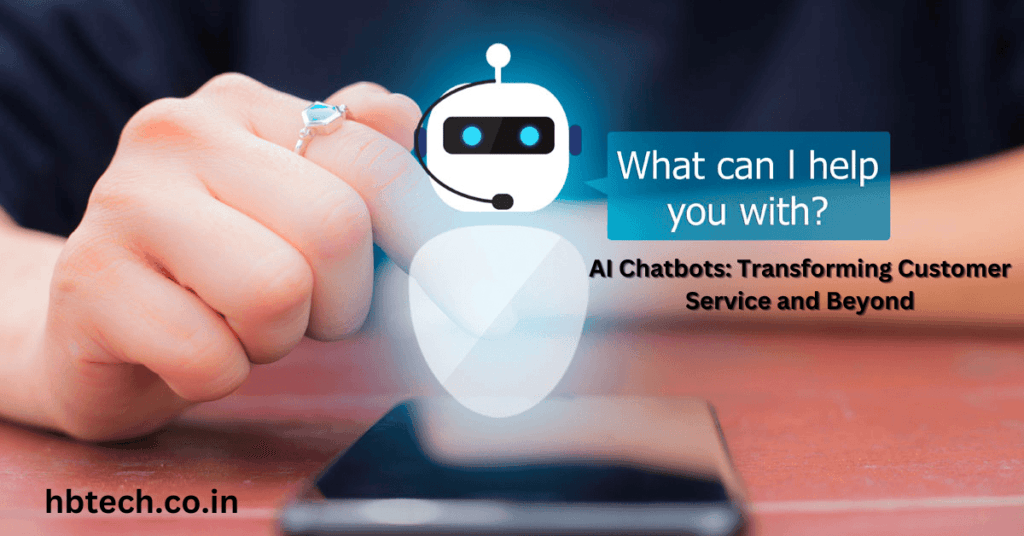AI chatbots are changing the way businesses communicate with people. These smart programs can handle conversations with customers, answer questions, and even help guide people through a buying decision. Although AI chatbots are mainly known for their use in customer service, they’re finding their way into healthcare, education, finance, and more. In this blog, let’s explore what AI chatbots are, where they’re used, and the benefits and challenges they bring.
What Exactly is an AI Chatbot?
AI chatbots are virtual assistants designed to communicate with users in a way that feels like a natural conversation. Unlike basic chatbots that follow a strict script, AI chatbots use advanced technology to understand human language, interpret questions, and provide meaningful responses. They’re powered by two main technologies:
- Natural Language Processing (NLP): NLP helps chatbots understand and interpret human language, even picking up on the intent behind questions.
- Machine Learning: With machine learning, chatbots can “learn” from their interactions over time. This means that the more they communicate, the better they get at responding to queries accurately.
How AI Chatbots are Used Today
AI chatbots are already transforming a wide range of industries. Here are a few ways they’re making a difference:
1. Customer Service
In customer support, AI chatbots handle common questions, provide instant help, and solve simple problems around the clock. They can answer frequently asked questions, help with billing inquiries, or even troubleshoot technical issues. When more complex issues come up, they pass it on to a human agent, keeping customer wait times down.
2. E-commerce and Online Shopping
Many online stores use AI chatbots as virtual shopping assistants. They help shoppers find products, check stock, track orders, and make personalized recommendations based on previous purchases. This creates a smoother, more interactive shopping experience.
3. Healthcare and Wellness
In healthcare, chatbots assist patients with booking appointments, sending medication reminders, and answering basic health-related questions. Some mental health apps use chatbots to offer simple breathing exercises or check-ins, making healthcare support more accessible and immediate.
4. Education
Chatbots in education help students by answering course questions, suggesting resources, and sending reminders about assignments. Teachers also use chatbots to handle administrative tasks like grading and attendance, freeing up more time for direct teaching.
5. Finance and Banking
Financial institutions use chatbots to help customers check account balances, track transactions, detect fraud, and even offer personalized advice. These chatbots give users quick, safe access to financial services without the need for long wait times.
6. Human Resources
Many companies are now using chatbots to handle HR tasks. Chatbots can answer employee questions about benefits, policies, and payroll, or help new hires get settled. This allows HR teams to focus on larger projects rather than managing repetitive questions.
The Advantages of AI Chatbots
AI chatbots offer many benefits to businesses and customers alike:
1. 24/7 Availability
AI chatbots are available anytime, day or night, so customers don’t have to wait until business hours to get help. This round-the-clock support improves customer satisfaction by providing instant answers.
2. Cost Savings
Chatbots can handle a large volume of repetitive queries, which reduces the need for large customer support teams. This allows businesses to save on staffing costs while keeping service levels high.
3. Scalability
Chatbots can manage multiple conversations at once, making them highly scalable. They’re especially useful during peak times when customer service demands are high.
4. Personalization
AI chatbots can use customer data from past interactions to personalize responses, making conversations feel more relevant and engaging. This leads to a better user experience and can even improve customer loyalty.
5. Valuable Insights
Chatbots track user interactions, providing businesses with valuable data on customer preferences, frequent questions, and pain points. This feedback can be used to improve products, services, and overall customer experience.
Challenges with AI Chatbots
While AI chatbots have many strengths, they also face certain challenges:
1. Difficulty with Complex Questions
Despite their abilities, chatbots can struggle with complex or unexpected questions, especially when customers use unique phrases or slang. Developers are working to improve language understanding in chatbots, but it’s still a challenge.
2. Lack of Human Touch
Chatbots, though efficient, don’t have the empathy that human agents offer. In situations where a customer is upset or needs a sensitive approach, a chatbot can fall short, and human assistance may be needed.
3. Privacy and Security Concerns
Since chatbots collect and store customer data, privacy and security are important issues. Companies must ensure that data is secure, especially in fields like finance and healthcare where privacy is critical.
4. Over-Automation Risk
Some businesses risk frustrating customers by over-relying on chatbots. People may feel blocked from talking to a human when needed, so balancing automation with human support is crucial.
The Future of AI Chatbots
AI chatbots continue to advance, and their future looks promising:
- Enhanced Emotional Intelligence: Future chatbots may better understand customer emotions, allowing them to respond with more sensitivity and empathy.
- Voice Integration: Chatbots that understand and respond to voice commands are on the rise, creating more natural, accessible interactions.
- Better Integration with Other AI Tools: As chatbots combine with other AI technologies like predictive analytics and augmented reality, they’ll offer even more personalized and engaging experiences.
AI chatbots have already made a significant impact in customer service and beyond, offering faster support, reducing costs, and improving user satisfaction. While there are challenges to address, the continuous improvements in chatbot technology promise a future where AI chatbots will be even more effective at helping businesses connect with customers in meaningful, efficient ways. With thoughtful development, they’re likely to become an indispensable part of how companies engage and serve their customers.
Frequently Asked Questions (FAQs)
What is an AI chatbot?
An AI chatbot is a virtual assistant powered by artificial intelligence that simulates human conversation. Unlike traditional rule-based chatbots, AI chatbots use natural language processing (NLP) and machine learning to understand and respond to questions in a natural, conversational way.
How do AI chatbots work?
AI chatbots use two main technologies:
Natural Language Processing (NLP): This helps chatbots interpret human language, recognize key phrases, and understand user intent.
Machine Learning: Machine learning enables chatbots to learn from past interactions, continuously improving their responses over time.What industries are using AI chatbots?
AI chatbots are used across various industries, including:
Customer Service: For answering FAQs, troubleshooting, and providing 24/7 support.
E-commerce: To assist shoppers with finding products and tracking orders.
Healthcare: For booking appointments, symptom checking, and providing mental health support.
Education: Assisting students with questions and reminders, while helping educators with administrative tasks.
Finance: For account inquiries, fraud detection, and financial advice.
Human Resources: Answering employee questions, managing payroll inquiries, and supporting onboarding processes.What are the main benefits of using AI chatbots?
AI chatbots offer several benefits:
24/7 Availability: They provide instant support at any time, improving customer satisfaction.
Cost Efficiency: Chatbots reduce staffing needs for repetitive tasks, saving on labor costs.
Scalability: They handle multiple queries simultaneously, especially useful during peak times.
Personalized Responses: Chatbots can use previous interactions to tailor responses, creating a more engaging experience.
Data Insights: Chatbots gather data on user preferences and frequent questions, offering valuable insights for business improvement.What challenges do AI chatbots face?
AI chatbots have some limitations:
Difficulty with Complex Queries: They can struggle with complex questions or unusual phrasing.
Lack of Human Touch: Chatbots lack emotional intelligence and may not handle sensitive situations as effectively as humans.
Privacy and Security Concerns: Chatbots collect user data, raising privacy and security concerns, especially in industries like healthcare and finance.
Over-Automation Risks: Relying too heavily on chatbots can frustrate customers who need human support.What is the future of AI chatbots?
The future of AI chatbots includes better emotional intelligence, increased voice integration for more natural interactions, and further integration with other AI tools like predictive analytics. These improvements will make chatbots even more effective and user-friendly.









